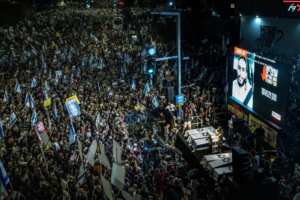Israeli Hostage Killings: A Nation’s Anguish and the Ongoing Conflict
The tragic killing of Israeli hostages in Gaza has ignited a wave of protests across Israel, reflecting the nation’s growing frustration and grief. As the country grapples with the loss of its citizens, the call for stronger action from the government has reached a fever pitch.

Protests Erupt Across Israel
In response to the deaths of six hostages in Gaza, Israel witnessed massive demonstrations, with up to 500,000 people taking to the streets in cities like Jerusalem and Tel Aviv. Protesters voiced their anger at the government’s inability to secure a ceasefire that could have saved the lives of the hostages. The public outcry has underscored a deep dissatisfaction with the current leadership’s handling of the crisis.
the demonstrations were particularly intense, with protesters blocking streets and gathering outside the prime minister’s residence. In Tel Aviv, the main highway was filled with demonstrators holding flags adorned with images of the murdered hostages, a powerful visual representation of the nation’s grief and demand for justice.
Government’s Struggle to Respond
The Israeli military recently recovered the bodies of the six hostages from a tunnel in Rafah, a city in the southern Gaza Strip. These individuals were found to have been executed by Hamas militants. This grim discovery has only fueled the anger of the Israeli public, who are demanding answers and action from their government.
Prime Minister Benjamin Netanyahu, facing immense pressure, has vowed to pursue those responsible for the killings. He has insisted that Israel will not rest until justice is served, blaming Hamas for the deaths and rejecting any notion of a ceasefire without clear terms. However, critics argue that Netanyahu’s refusal to engage in ceasefire negotiations sooner may have contributed to the tragic loss of life.
Senior Hamas officials have deflected blame, accusing Israel of being responsible for the deaths due to its reluctance to agree to a ceasefire. This ongoing blame game has deepened the divisions and stoked the flames of an already volatile situation.
International Reactions and Ongoing Negotiations
The international community, particularly the United States, has condemned the killings. U.S. President Joe Biden expressed his devastation and outrage over the deaths and promised that Hamas leaders would face consequences for their actions. He also reaffirmed his commitment to securing a deal that would lead to the release of the remaining hostages.
Read More :- “All Eyes on Rafah” Decoding a Viral Social Trend on Israel’s War
Despite months of diplomatic efforts, negotiations to secure a ceasefire and release the hostages have stalled. Mediators from the United States, Qatar, and Egypt have struggled to bridge the deep mistrust between Israel and Hamas, with key issues like the withdrawal of Israeli forces from specific areas of Gaza remaining unresolved.
Humanitarian Concerns Amidst the Conflict
As the conflict rages on, the humanitarian situation in Gaza continues to deteriorate. Israel’s military offensive has caused significant casualties, with thousands of Palestinians losing their lives. The Gaza Strip, home to over 2 million people, is facing severe shortages of food, shelter, and medical supplies.
Israel and Hamas agreed to temporary pauses in fighting to allow for a polio vaccination campaign in Gaza. This initiative, aimed at vaccinating hundreds of thousands of children, highlights the desperate need for humanitarian aid in the region. However, the broader crisis remains dire, with the ongoing violence making it difficult to deliver essential services to those in need.
The killing of Israeli hostages in Gaza has marked a painful and tragic chapter in the ongoing conflict between Israel and Hamas. The nation’s collective grief has manifested in widespread protests, as citizens demand more decisive action from their leaders. As the situation continues to unfold, the world watches closely, hoping for a resolution that will bring an end to the suffering on both sides and prevent further loss of life.